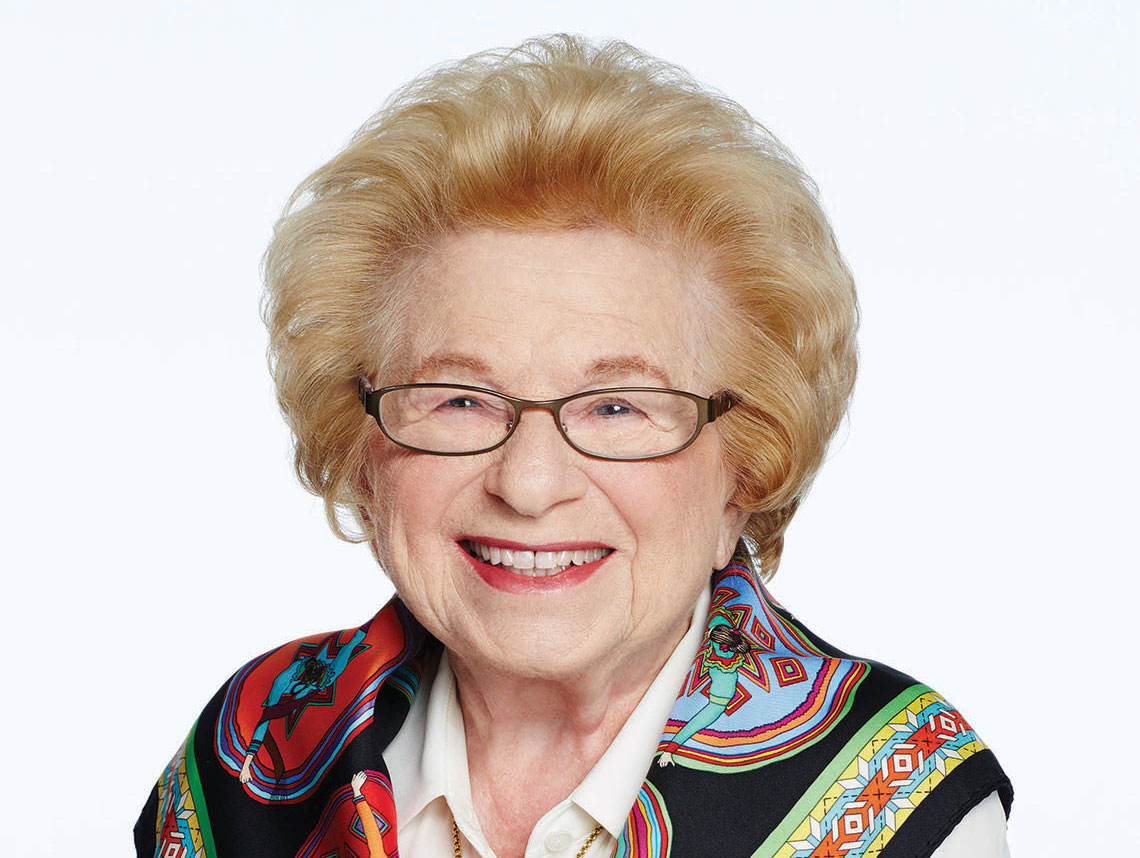 Dr. Ruth
Dr. Ruth Ruth Westheimer is not someone who gets embarrassed easily.
At 88 years old, the therapist, author and media personality better known as Dr. Ruth still is giving the kind of frank sex advice that would make some people half her age blush.
An iconic figure in the art of sexual-health straight talk, Dr. Ruth is known for her pioneering 1980s radio show “Sexually Speaking,” television programs such as “The Dr. Ruth Show,” her globally syndicated advice column “Ask Dr. Ruth,” and more than 40 books, including “Sexuality in the Jewish Tradition” and her latest, “The Doctor Is In: Dr. Ruth on Love, Life and Joie de Vivre.”
On Feb. 4, Dr. Ruth will bring her expertise to Los Angeles, appearing as the keynote speaker at the annual Sexual Health Expo, an upscale sex-education event at the California Market Center. Her talk is titled “Dr. Ruth on Sexual Literacy: The Knowledge Base You Need to Have Terrific and Safer Sex.”
Notwithstanding her impressive career in sex therapy, Dr. Ruth’s life has been far from one-dimensional. Born in 1928 in Germany, she was evacuated to a children’s home in Switzerland at the age of 10 to escape the Holocaust. In her late teens, she went to Israel and became a sniper for the Jewish underground army, Haganah, and was injured by a bomb. After spending time in France, she moved to the United States in 1956 and obtained a doctorate in education from Columbia University. She went on to study human sexuality at the New York Hospital-Cornell University Medical Center, and she worked for Planned Parenthood and as an adjunct professor at Lehman College in the Bronx before rising to fame with her “Sexually Speaking” radio show.
In a phone interview with the Jewish Journal from her home in New York, Dr. Ruth spoke about her upcoming West Coast trip and offered some of her trademark sex advice.
Jewish Journal: What do you plan to talk about at the Sexual Health Expo in Los Angeles?
Dr. Ruth Westheimer: I will talk about sexual literacy. I will talk about many of the things that we now know. [In the United States], we have the best scientifically validated data about human sexuality. [But] there are still things that have to be researched, and we still need some more good studies in order to have everybody have the best sex life possible.
JJ: What is sexual literacy? How can people become more sexually literate?
RW: Sexual literacy is that people have to know about their own bodies, what they need, what is pleasurable to them. And once they are in a relationship, they have to know about their [partner’s] body’s needs and desires.
One of the reasons that I have been talking so openly for the last … maybe 50 years about issues of sex is because, for us Jews, sex has never been a sin, but always an obligation to be engaged in by a couple and to make sure that they do have sex on Friday night — that it is a mitzvah.
I’m old-fashioned and a square, and I believe that the best sex is in a relationship, not necessarily marriage, but in a relationship — that people know each other and trust each other.
JJ: What’s your single biggest piece of advice for people looking to improve their sex lives?
RW: To read some books. They don’t have to be just my books. And to make sure that they say, “I would like to pleasure my partner as best I can.” With these good intentions, people can learn. … They can look at some movies, but they shouldn’t think that movies depict a realistic picture of sex. Any of the sexually explicit material is exaggerated. Nobody can have sex like [that].
JJ: You’ve been giving people sex advice for a long time. How have attitudes toward sex changed?
RW: The attitudes have certainly changed. People are much more willing to learn, much more willing to ask questions, and even a fair like this one in Los Angeles shows that there is a thirst, a desire for people to be better lovers. And I welcome that. I think that is wonderful.
One thing that certainly has changed: Women have to take the responsibility for their sexual satisfaction. They can’t say, “If he loves me, he has to know what I need.” That doesn’t work.
Then there’s a whole body of knowledge that women have to know because very often they don’t know that just before an orgasmic response there is a moment where nothing happens. … Very often a woman says, “OK, it’s not going to happen.” She gives up. She has to know that [in] that moment where nothing happens, she just has to continue to be stimulated or to stimulate herself in order to be sexually satisfied.
JJ: What progress do you think still needs to be made when it comes to sexuality?
RW: I think that people still have to learn when they are in a relationship not to be bashful, but to make sure that the partner knows what they would like. And if they would like something that the partner does not want to do, then they have to accept that. In the olden days, that would have been about oral sex. These days, I hear that more about anal sex. … Nobody should ever be pressured into an activity that they don’t want.
Dr. Ruth Westheimer will speak at 2 p.m. on Feb. 4 at the Sexual Health Expo at the California Market Center, 110 E. Ninth St., Los Angeles. For free tickets, visit this story at jewishjournal.com .





















 More news and opinions than at a Shabbat dinner, right in your inbox.
More news and opinions than at a Shabbat dinner, right in your inbox.